Less than 2% of the popuLation: Westminster community unpacks, anaLyzes being bLack at a primariLy White utah coLLege

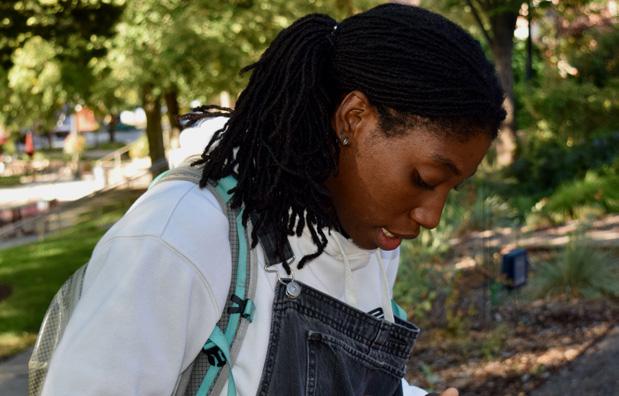
At Westminster College, there’s a variety of students. Some don jerseys with the school’s branding splashed on their purple clothing, others wear cuffed pants, worn hats and Patagonia backpacks like they’re perpetually on a hike. There are students like these and more — those who dress completely distinctively and those who seem to follow a loose uniform of their major or subculture. (Continued on page 2)
CAMPUS COMMUNITY

LESS THAN 2% OF THE POPULATION:
TECHNOLOGY INNOVATION
WESTMINSTER COMMUNITY EXPLORES CHATGPT, EXAMINES ARTIFICIAL INTELLIGENCE IN HIGHER EDUCATION

STUDENT ENGAGEMENT LIBRARIANS OFFER RESOURCES, GUIDANCE FOR STUDENTS FOR WESTMINSTER COMMUNITY
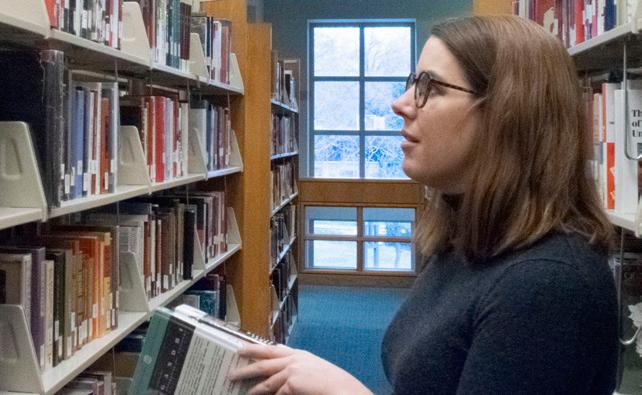
PODCASTS

GRIFF’S ROOST BARISTA SEEKS TO IMPROVE CAFE FOR WESTMINSTER COMMUNITY

MARCH 1, 2023
TWITTER @WCFORUMMEDIA FACEBOOK @WCFORUMMEDIA INSTAGRAM @WCFORUMMEDIA
YOUTUBE WESTMINSTER COLLEGE FORUM MEDIA
PAGE 1 PAGE 4
WESTMINSTER COMMUNITY UNPACKS, ANALYZES BEING BLACK AT A PRIMARILY WHITE UTAH COLLEGE
PAGE 6
CAMPUS RESOURCES
PAGE 8
LALISÉ ESHETÉ
Angelina Mayar, a senior sociology major, sits at a table outside Richer Commons on Sept. 23, 2022. "I picked Westminster College because it’s a small campus, and I thought there was going to be a lot of intimate conversations and community," Mayar said. "I got the very exact opposite of that." Find more at wcforummedia.com
THE FORUM
PODCASTS
EDITOR-IN-CHIEF, & VIDEO DIRECTOR ZIDIA GIBSON
PRODUCTION EDITOR, MANAGING EDITOR & PODCAST DIRECTOR
VANESSA EVELETH
BUSINESS DIRECTOR, ONLINE MANAGER
RYLEE BROWN
SOCIAL MEDIA COORDINATOR
SNOW LINDEMUTH
ADVISER MATT BAKER
EDITORIAL
forumeditor@westminstercollege.edu
This story was initially written in Fall 2022 by former Forum reporter Lalisé Esheté.
(Continued from page 1)
Though all these students wear different clothes, the majority of them have something blatant in common.
Westminster students are overwhelmingly white.
Black students are the third smallest racial/ethnic group at Westminster, amounting to 27 students as of Oct. 15, 2021, according to the 2021–2022 Common Data Set published by Westminster. The smallest racial/ethnic groups are Native Americans and Pacific Islanders, according to the Common Data Set.
These statistics correspond to Utah’s population distribution as a whole: It’s estimated white people account for 90.3% of the population while Black people represent 1.5% of the state’s population as of July 2022, according to the United States Census Bureau.
Samara Thorell, a junior nursing major, said being Black at Westminster makes her especially
vulnerable to feeling isolated, despite belonging to a small group.
“I’m always the only Black student in every class,” Thorell said. “I’ve never had one class where there were two of us. It's a very weird feeling; I hate it a lot.”
The Black Community On Campus and Lack of Diversity
Westminster is committed to creating an inclusive and welcoming environment for all members of the community, according to the college's website.
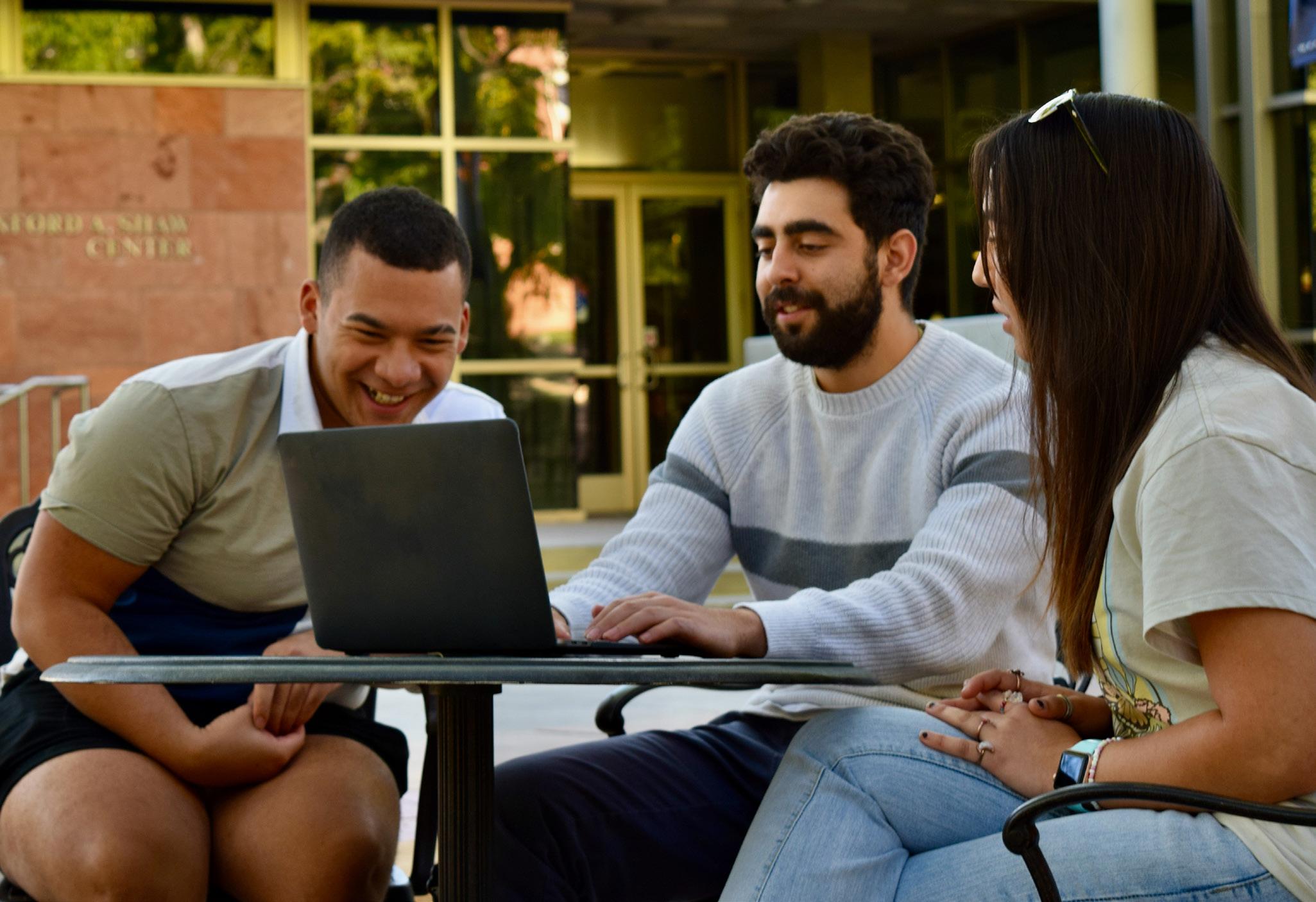
Senior sociology major Angelina Mayar said Westminster’s commitment does not ring true.
was going to be a lot of intimate conversations and community,” Mayar said. “I got the very exact opposite of that.”
Other students said they echoed Mayar’s sentiments.
Flore Elliott, a senior chemistry major, said she noticed the Black community at Westminster seemed to be “nonexistent” and “in the shadows” during her first year.
“I don’t think there’s really much of a group unless you’re in the same team [...] or in the same class,” Elliott said. “I feel like there might be a ‘friend group’ but not like a ‘community group’ that every Black person on campus is really a part of.”
Junior nursing major Samara
being her third year.
“Half of us don’t think there’s other [Black] people,” Thorell said.
Changes in enrollment patterns might be impacting the presence of Black community, according to Nick LockhartAllen, a senior public health major and resident adviser.
“As a [RA] I can kind of see the incoming students and the demographics of the last couple years; and the Black student population has significantly decreased,” Lockhart-Allen said.
The overall ratio of Black students at Westminster has remained at around 2% of the population for the last five years, according to Westminster’s Common Data Sets; however, a decrease in the student population means around 20 fewer Black students on campus than in 2018.
Economics professor Michael Mamo said Westminster’s lack of Black students may be due to the image of Westminster as a school that's prestigious and lacking in diversity.
“[Black students] don’t want to be singled out [...] its not a good feeling,” Mamo said.
“I picked Westminster College because it’s a small campus, and I thought there
Thorell similarly said she doesn't know a lot of the other Black students on campus despite it
(Continued on page 3)
CAMPUS COMMUNITY 2
LALISÉ ESHETÉ AND ZIDIA GIBSON STAFF REPORTER AND EDITOR-IN-CHIEF
LALISÉ ESHETÉ
Nick Lockhart-Allen, a senior public health major, sits outside of Shaw Student Center viewing a shared laptop with Isaac Cortés, a senior communication major, and Akary Herrera, a junior sociology major, Sept. 22, 2022. Lockhart-Allen said he has managed to make a community for himself during his senior year, though many of his fellow Black students have already graduated.
Content published by The Forum does not reflect official views of Westminster College.
The first issue of The Forum is free; additional issues cost $1. Pay to The Forum office.
I’M ALWAYS THE ONLY BLACK STUDENT IN EVERY CLASS. I’VE NEVER HAD ONE CLASS WHERE THERE WERE TWO OF US. IT'S A VERY WEIRD FEELING; I HATE IT A LOT
SAMARA THORELL junior nursing major
(Continued from page 2)
Nick Lockhart-Allen, a senior public health major and RA, said he feels this prestige-perception influences prospective students.
“Westminster kind of shows ‘I’m an expensive school,’” Lockhart-Allen said. “I feel like that turns away a lot of Black students because a lot of marginalized communities— especially in Utah—come from a lower socioeconomic status.”
The median household income in 2021 was $77,999 for white people and $48,297 for Black people (the lowest median income), according to the United States Census Bureau.
Westminster’s tuition and fees in 2022-23 for undergraduate students cost $39,832 prefinancial aid, according to the college webpage.
“I feel like just seeing [Westminster’s] price tag is an automatic turnoff,” LockhartAllen said. “But for me, I came here and I learned about like, all the financial aid opportunities [...] and all the different things that they don’t quite tell you upfront.”
The Black Excellence Initiative
For senior sociology major Angelina Mayar, meeting with the Black Excellence progam members every Monday and Wednesday was her entry into knowing other Black people during her first year, according to Mayar.
Mamo said Black Excellence has high turnover of leaders and members because of the low population of Black students at Westminster.
“The [students] that are in the club will graduate and leave campus without being replaced, leaving the club to die,” Mamo
BUILDING A COMMUNITY [AT] WESTMINSTER IS HARD,
THIS CAMPUS
Between 2018 and 2019, Black Excellence was active, but the program is less involved and there are fewer members as of this past year, according to Mayar.
Michael Mamo, who has taught economics at Westminster for 20 years, said there’s been attempts to create a Black community on campus with the Black Excellence progam for the entire time he’s worked here.
said. “It’s not quite a longstanding club on campus.”
Victoire Soumano, a senior geology major, is the most recent student who volunteered to revive the Black Excellence program.
Soumano said she was handed the reins of presidency in 2020, during the midst of the pandemic, and has led the initiative for the three years since.
Though there are resources to host events as a schoolfunded initiative, the specificity of her audience made it difficult to get the word out about Black Excellence, according to Soumano.
“Building a community [at] Westminster is hard, because there’s only like two-and-a-half black people on this campus,” Soumano said. “So it’s really hard to reach people.”

Soumano said turnout is usually low, with the exception of Share Your Culture, an event where students shared their cultural foods and dress last year in collaboration with Raíces Unidas and the Asian American and Pacific Islander Life programs.
Soumano said
her current goal is to find someone to take over her responsibilities before she graduates on May 6.
“I don’t want [Black Excellence] to go dormant like it did last time because it takes so much more effort to wake it up than it does to just transition to someone else,” Soumano said.
Being ‘Othered’ as a Black Person On Campus
Black people who have attended college are more likely to face racial slurs and microaggressions, according to a Pew Research study on Black Americans’ experiences of racial discrimination.
Black students often experience these forms of racism in college because they are thrust into historically and predominantly white institutions where they are attending classes, or even rooming with students who have “problematic views and prejudices,” according to Psych Central, an independent mental health information and news site.
As a result, Black students and students of color report higher rates of emotional distress and isolation during their first year of college, according to the American Council on Education.
Michael Mamo, a chairperson of the economics and international business program, said though he appreciates his colleagues who are “welcoming and progressive thinking people,” he has come to accept that he will be treated differently as one of the few Black people part of Westminster’s faculty.
“You recognize [as a Black person], you are not always an insider,” Mamo said. “You [...] have to play that role of an outsider.”
Mamo said he is likely one of the only faculty members on campus who consistently has to use their school ID.
“Whenever I show up — let's say to check books out for the library — the student workers there have to ask, ‘Who are you, are you a student?’” Mamo said. “This happens to me in the cafeteria [and] in the computer lab.”
(Continued on page 4)
3 CAMPUS COMMUNITY
LALISÉ ESHETÉ
Victoire Soumano, a senior geology major and current president of Black Excellence, works at a table outside in Richer Commons Sept. 22, 2022. Soumano said she is the most recent student who volunteered to revive the Black Excellence program, which "seeks to build community through the shared interest and/or identity of blackness," according to the Student Diversity and Inclusion webpage.
BECAUSE THERE’S ONLY LIKE TWO-AND-A-HALF BLACK PEOPLE ON
VICTOIRE SOUMANO senior geology major black excellence president
(Continued from page 3)
In teaching his latenight Master of Business Administration courses, Mamo said he would often have similar encounters with campus patrol, who would question who he was and why he was trying to enter a building.
Victoire Soumano, current president of Black Excellence and a senior geology major, said she experienced microaggressions and got stared at — especially in her first year at Westminster — and had to stand up for herself.
Soumano said one incident in particular occurred when a group of teenagers in a truck screamed racial slurs at her as she was walking to school with her friend.
Nick Lockart-Allen, a senior public health major and RA, said he also experienced racism while walking with another white student (that he didn’t know) from a bus stop to the school, who reportedly “stepped off the sidewalk” to avoid walking with him.
Lockhart-Allen said he had a similar interaction again with a white student, who crossed the street to avoid walking with him to the bus stop while continually looking back at him like he was “going to do something.”
Samara Thorell, a junior nursing major, in contrast, said they hadn’t had any major experiences of racism at Westminster.
Angelina Mayar, a senior sociology major, said being Black affects her trust in the administration.
Mayar said she wouldn’t report any incident of racism because she is “unsure of any administration
working in favor of students of color.”
Tamara Stevenson, chief diversity officer and vice president of Diversity, Equity and Inclusion, said her office oversees the bias, incident and reporting protocol. This process is a way to provide
sometimes feels Westminster tokenizes its underrepresented groups.
Tokenism is the practice of doing something only to prevent criticism and give the appearance that people are being treated fairly, according to a 2022 Forbes

Building a community in a location with limited Black culture is challenging, but not impossible, according to Tamara Stevenson, chief diversity officer and vice president of Diversity, Equity and Inclusion.
“I definitely want to be careful to note that community can't be forced,” Stevenson said. “What I can do is help support the conditions [...] but it's really up to the students to connect.”
Stevenson said students would have to trust the DEI office to engage with them, which can be fostered by “ensuring students are welcome in the classrooms, that they are reading about themselves [and] studying about themselves.”
education and support to people who may have experienced a mistreatment due to an aspect of their identity, according to Stevenson.
The DEI Office was created in 2016 and arose out of student activism, particularly a student protest that took place on campus in 2015, according to Stevenson.
Stevenson said she recognizes some students might not trust the bias reporting process.
“I know that's part of the reason why we don't get as many reports. I think another reason is that students don't know that that process exists,” Stevenson said.
Anyone can report a bias incident on the Westminster website, according to Stevenson.
Fostering Black Community, Trust and Awareness
Senior sociology major Angelina Mayar said she
article describing ways companies tokenize underrepresented employees.
“I think [the college uses] programs like First Scholars, previously known as Legacy, and Black Excellence to use students as photo-ops as a way to explain, ‘Oh we’re a diverse school,’ but they don’t really take the time to make it important,” Mayar said.
Flore Elliott, a senior chemistry major, said lacking a Black community means giving up an essential part of college social life.
“If I did [have a community] I probably wouldn’t be so antisocial,” Elliott said. “It's about having a safe space, having people to talk to who truly, truly understand. My white friends do their darndest, and they do understand as much as they possibly can, but they definitely don’t fully understand what it’s like [to be Black in the U.S.].”
Westminster’s Black Student Union and Black Excellence program are two groups on campus, each with different goals and student participants who “have different desires about how they want to build community,” according to Stevenson.
“The Black Student Union really includes conversations about structural barriers and the things that are concerning [students] in terms of their college education or their on-campus experience,” Stevenson said. “Whereas you have Black Excellence, it's sort of saying we just want to not have the pressure of talking about more challenging issues.”
Economics professor Michael Mamo said he still has hope for the future of Westminster.
“Minority students should be encouraged to come [to Westminster] because it's a welcoming campus [open to] new ideas,” Mamo said. “I think there is a bright future [ahead].”
Westminster community expLores chatgpt, examines artificiaL inteLLigence in
ChatGPT has sparked discussions across the country about the role of artificial intelligence in higher education and how institutions are adapting their curriculum and teaching methods to this new platform, according to a New York Times article.
higher education
Westminster College honors professor Julie Stewert said professors and students are experimenting with ChatGPT in the classroom. Stewart co-teaches Data, Society and DecisionMaking with management professor Alysse Morton, and said they decided to implement ChatGPT in the course.
“We really want to play with [ChatGPT] in the classroom because that is the perfect space to explore what this means for us as people, students and professors,” Stewart said.
The class seeks to explore the connection between data and the process of decision making, “with examples from a variety of fields
used to illustrate its successes and failures,” according to the Westminster Course Catalog.
Yovie Saiz Rodriguez, a senior psychology major and student in the Data, Society and DecisionMaking class, said she used ChatGPT for the first time in this course.
(Continued on page 5)
4 CAMPUS COMMUNITY
RYLEE BROWN ONLINE MANAGER
I DEFINITELY WANT TO BE CAREFUL TO NOTE THAT COMMUNITY CAN'T BE FORCED. WHAT I CAN DO IS HELP SUPPORT THE CONDITIONS [ ] BUT IT'S REALLY UP TO THE STUDENTS TO CONNECT
TAMARA STEVENSON chief diversity officer and vice president of diversity, equity and inclusion
(Continued from page 4)
For a class assignment, Rodriguez said she prompted ChatGPT to write something involving two unrelated concepts.
“I combined the topic of chicken noodle soup and a bad breakup,” Rodriguez said. “The poem that came out was really creative and I explored it a lot after.”
Rodriguez said she noticed similar patterns of wording as she generated more poems on new topics and the poems started to become less original.

“I think it was really cool to be introduced to [ChatGPT] and cover the cool aspects as well as the danger behind [ChatGPT], and maybe how we can’t always rely on computers for everything,” Rodriguez said.
ChatGPT In Action
This new form of AI was created to perform in a conversational manner, making it easier for users to interact with and prompt the program, according to OpenAI, the creators of ChatGPT.
The dialogue format makes it possible for ChatGPT to answer follow-up questions, admit its mistakes, challenge incorrect premises and reject inappropriate requests, according to OpenAI.
ChatGPT’s creators’ mission is to develop and research AI that “benefits all of humanity,” according to OpenAI’s About webpage.
Honors professor Julie Stewart said ChatGPT is the
“newest iteration of one of those impressive computing capacities.”
“One element of [Data, Society and Decision-Making] is looking at the ways in which big data shapes our lives,” Stewart said. “Big data paired with artificial intelligence means big capacities.”
Big data refers to the exponential increase and availability of data in our world, according to the University of Wisconsin Data Science
really interesting things to explore with ChatGPT, but algorithms are only as good as the data that is fed into them.
“You should always check the work [ChatGPT] gives you,” Morton said. “It definitely gets a number of things wrong.”
Morton, who also teaches math courses, said she entered mathematical problems into ChatGPT and had an overall failure rate of 40%, answering 6 out of 10 correctly.
THERE'S SOME GREAT BENEFITS THAT COULD COME, THERE'S ALSO SOME REALLY BIG PITFALLS THAT WE COULD GET INTO. [CHATPGT] COULD REALLY TAKE THE BOTTOM OUT OF HIGHER ED
webpage. Stewart said she and management professor Alysse Morton are “intensely interested” in big data.
“[Big data is] everything from the way we think about smallscale decisions, about what to eat, where to go, where to live, all the way up to the really big decisions that are made on a societal level,” Stewart said.
Another part of the Data, Society and Decision-Making class includes looking at algorithms today and how a variety of fields are adjusting to fix algorithmic issues, according to Morton.
Morton said there are a lot of
Faculty Discuss ChatGPT’s Capabilities
“I was instantly amazed, and somewhat bewildered and intrigued, by the capacity of this generative AI,” said honors professor Julie Stewart, who co-teaches Data, Society and Decision-Making with management professor Alysse Morton.
Stewart said she could imagine a ChatGPT connection between “almost every assignment I could give to a student.”
“From the perspective of a professor thinking about student
work, ChatGPT is the ultimate shortcut, right?” Stewart said.
Yet, this new technology can be compared to computers and calculators, which were developed over time to do many tasks for people, according to Stewart.
Stewart said, “I started to think about [ChatGPT] in those terms and thought, ‘Okay, this is not dissimilar to a calculator or something equivalent. What are ways we can use this technology to enhance learning to spark creativity?’”
Students could potentially use ChatGPT to draft a written assignment, but then work on the product to make it more personable, according to Stewart. Letting ChatGPT deal with more detailed work that doesn’t require deep thinking is another possible use, Stewart said.
Stewart said she advises people to use ChatGPT intentionally and mindfully to avoid deconstructing the foundations of higher education.
“I think that there are techniques we can use to hopefully have our cake and eat it, too,” Stewart said. “There's some great benefits that could come, there's also some really big pitfalls that we could get into. It could really take the bottom out of higher ed.”
Administration Response to ChatGPT
Westminster College does not currently have an official press release about the school’s policies on ChatGPT, as of Feb. 24.
President Beth Dobkin said this kind of AI technology, and its use in education, is inevitable, in an interview on Jan. 3.
“What I think we can do is adjust our teaching and expectations to create assignments that are still genuinely human,” President Dobkin said.
(Continued on page 6)
5 TECHNOLOGY INNOVATION
JULIE STEWART honors professor
RYLEE BROWN
Julie Stewart, honors professor, co-teaches the Data, Society and Decision-Making class with Alysse Morton, management professor, Feb. 9 in the Bill and Vieve Gore School of Business. Students interacted with ChatGPT during the first week of class by generating prompts combining different topics, according to Data, Society and Decision-Making student and senior psychology major Yovie Saiz Rodriguez.
(Continued from page 5)
Representatives from the Writing Center, Giovale Library and Computer Science department will host a ChatGPT workshop on March 21 for faculty to learn more about the technology, how it works and how to meaningfully engage with it in a classroom setting, according to the Westminster campus calendar webpage.
ChatGPT has great applicability as a tool and will create adequate results, “but I don’t know if it will ever have that spark of innovation and creativity that comes from individuals,” according to President Dobkin.
President Dobkin said relying on ChatGPT to complete one’s school assignments is like any form of cheating.
“It really compromises the person that’s using [ChatGPT] to cheat more than anybody, right?” President Dobkin said. “Because you’re not learning what you need to learn when you take shortcuts.”
ChatGPT in Salt Lake City Higher Education
The University of Utah released official statements and
guidelines for using ChatGPT on Jan. 28, according to a press release from the U.
“If students choose to use these tools in some capacity related to creative work, they must make evident any portion of the work generated by the AI tool and which AI tool they use.”

The press release also said faculty members will provide specific policies relating to the tools and their courses, according to the U press release.
Lucas Arico, a junior communication major, uses ChatGPT in the Data, Society and Decision-Making class Feb. 9 in the Bill and Vieve Gore School of Business. President Beth Dobkin said this kind of AI technology, and its use in education, is inevitable, in an interview on Jan. 3.
Salt Lake Community College does not have an official statement on ChatGPT policies as of Feb. 10, however an employee training program took place Feb. 24, with a breakout session titled “Keep Calm and ChatGPT: Let's
Talk about Artificial Intelligence and Student Writing,” according to the SLCC campus event page.
The event was for newly hired and past employees to celebrate company accomplishments as well as reflect on the college's
current strategic plan, according to the SLCC campus event page.
student engagement Librarians offer resources, guidance for Westminster community
RYLEE BROWN ONLINE MANAGER
Katherine Tucker Paterson, a student engagement librarian at Giovale Library, said she encourages students to utilize the librarians’ guidance in addition to the resources offered at Giovale.
The librarians offer assistance with research, coursework and using the databases and technology at Giovale, according to Spencer DeVilbiss, systems librarian.
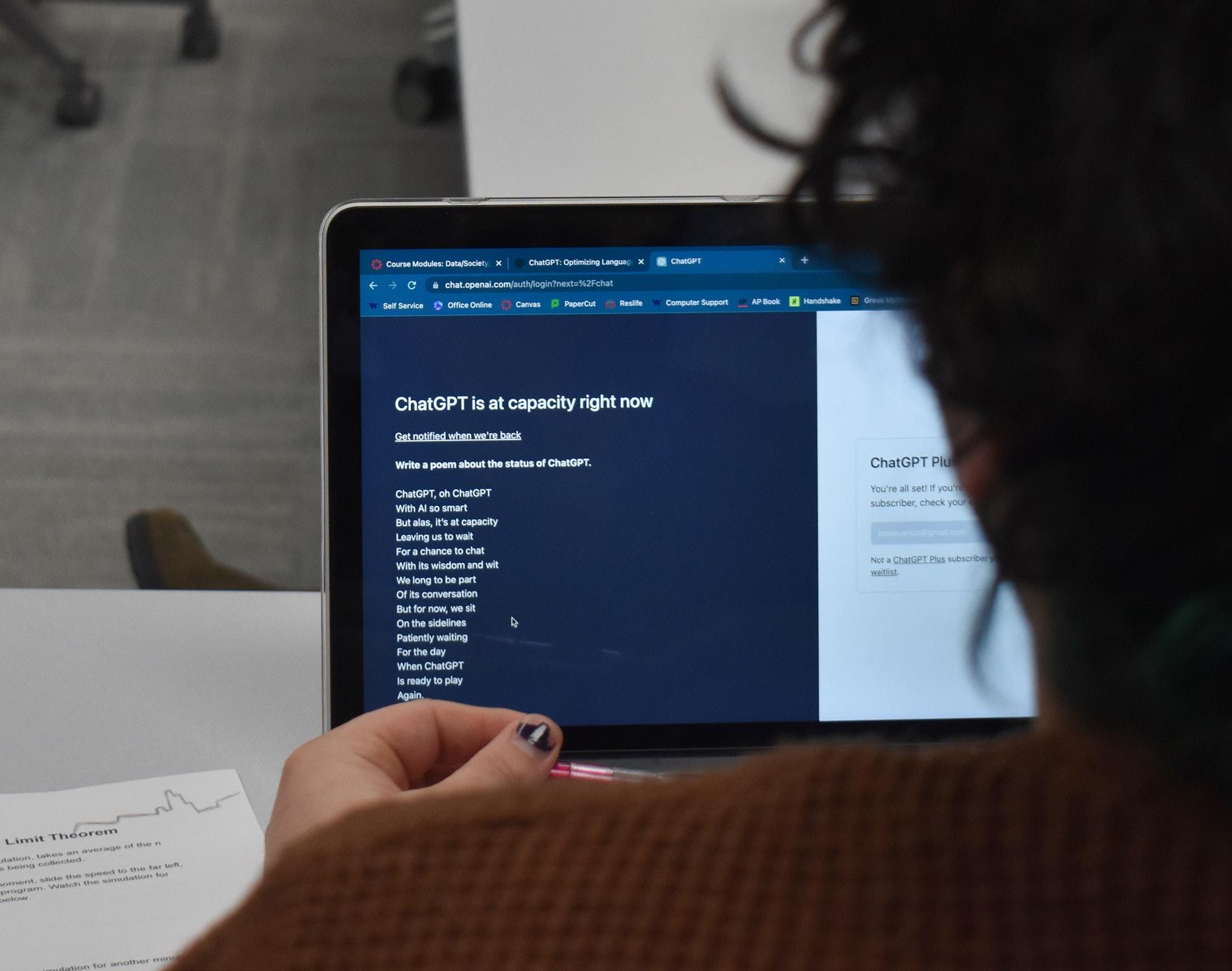
DeVilbiss said a systems librarian helps streamline technology services and maintain and use the Giovale information systems.
Giovale has five subject librarians who each cover six to nine liaison areas, or different disciplines, at Westminster College, according to the
Academic Subject Library Liaisons webpage.
“We all have our different subjects that we can help with,” DeVilbiss said. “I'm a liaison for the political science majors, so if anybody has any questions about that, they get directed to me and I can help with the research paper they are working on.”
DeVilbiss’s nine liaison areas of expertise are:
• Anthropology
• Art
• Athletics
• Computer Science
• Data Science
• Human Performance and Wellness
• Math
• Music
• Political Science
Lily Doyle, a first-year custom
WE LOVE CHATTING WITH STUDENTS. I THINK SOMETIMES, MAYBE AS A STUDENT, YOU THINK THAT YOU'RE BOTHERING US, BUT IT IS OUR JOB TO TALK TO YOU AND LIKE WE REALLY LIKE IT
psychology and art therapy major, said she has only spoken with the librarians once, at the beginning of the year, to ask for help with the printer.
Doyle said she remembers hearing about the librarians as a resource at First-Year Orientation, and one time when a librarian spoke in her psychology class.
“I’m sure in the future I will [reach out], when I am in more difficult classes,” Doyle said.
Zayden Tethong, student engagement librarian, said she knows it can be intimidating to stop by and ask for help, “but we’re a friendly bunch.”
“We love chatting with students,” Tethong said. “I think sometimes, maybe as a student, you think that you're bothering us, but it is our job to talk to you and we really like it.”
(Continued on page 7)
6 TECHNOLOGY INNOVATION
RYLEE BROWN
ZAYDEN TETHONG student engagement librarian
(Continued from page 6)
Student engagement librarian Zayden Tethong said navigating research can be confusing or challenging — even for the librarians themselves.

“We're here to help you figure it out as you go and support your academic goals,” Tethong said.
Tethong said any mode of contact such as an email, walkin appointment or phone call is encouraged for reaching out to a librarian.
“Whatever [form of communication] works for you is fine with us, as long as you're using us as a resource. That's what makes us happy,” Tethong said.
Tethong’s eight liaison areas of expertise are:
• Counseling
• Environmental Studies
• Film Studies
• Honors College
• Justice Studies
• McNair Scholars Program
• Neuroscience
• Psychology
Sydni Hayes, a junior nursing major, said if there’s an article or book the library doesn’t have, the librarians will take the time to find and provide it for free.
“I’ve had so many interactions with the librarians,” Hayes said. “One of my favorite things about the librarians is that they always go above and beyond to make sure
you have all the access you need to books, articles and data.”
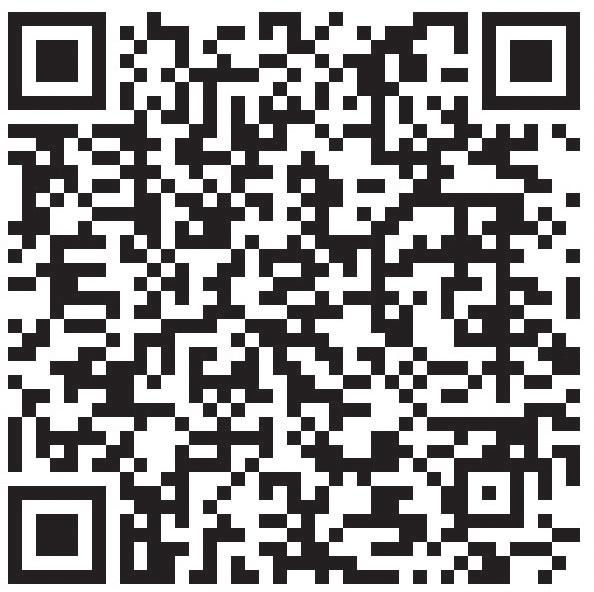
Hayes said seeing how passionate the librarians are for providing this type of access “makes me feel truly supported in my education.”
Katherine Tucker Paterson, a student engagement librarian, said one of the reasons she wanted to work at Westminster was because she loves working with students — Westminster students in particular.
“[Students] here at Westminster are really passionate about what they're doing,” Paterson said. “I think one of the reasons why I really wanted to come here is because the students seem so engaged, not just academically but with our community.”
Paterson said working as a student engagement librarian “combines all the things I love about academic libraries.”
Paterson’s eight liaison areas of expertise are:
• Communication
• First Scholars
• Gender Studies
• Languages
• Literature, Media and Writing (formerly English)

• Public Health
• School of Nursing and Health Sciences
• Sociology
The following interview has been lightly edited for brevity and clarity.
Q: How long have you been working at Westminster?
A: So I'm actually pretty new to Westminster. I started here last May, so almost a year which is really exciting. But I've worked in libraries since I was an undergraduate.
I went to the University of Utah and I worked in their rare books library. That kind of led me to eventually moving to Chicago, going to graduate school for library science, working in a couple of different libraries and then coming here to Westminster — which brought me back to Utah. So I'm very happy to be here.
Q: What do you do here at Giovale Library?
A: [Besides] assisting students in their research papers, I'm also in charge of instruction for the writing emphasis classes. So every writing emphasis class has an information literacy portion, and I'm in charge of coordinating that and kind of helping with the curriculum there.
I cover any information literacy instruction for those kinds of classes. I come in for usually one or two classes sessions.
I am also in charge of just making sure we have a schedule.
I also do the library social media and kind of help coordinate events here.
Q: How do you decide which academic areas you are in charge of as a librarian?
A: It’s a mix of having librarians with a background in that information, and most of the subjects that I [am a liaison for] are things that I'm really interested in.
As far as nursing, I've never been in health sciences before, but I do know how to find things for nurses. A lot of what we do is we learn more about the resources available for the discipline, and then learning about the discipline comes next.
I would say, for all of us who aren't familiar with a subject that we are assigned, it's part of the job to kind of learn about that discipline.
Q: What do you wish students knew about coming to see a librarian?
A: As librarians we just wish students know how available we are. I think, there's so many resources on campus and it's hard to know, like, which ones to take advantage of and when.
But I think if I could tell students anything, it's that if you do have questions about anything, we really don't want you to struggle in silence. We're here for you.
Q: What is your favorite part of your job?
A: I love working with students. It's really refreshing to be able to talk to young people, who have a lot of great ideas and are just kind of starting off in their careers.
7 CAMPUS RESOURCES
RYLEE BROWN
Check out the rest of this story
Katherine Tucker Paterson, student engagement librarian, discusses the importance of helping students with research papers with Zayden Tethong, student engagement librarian, on Feb. 20 at Giovale Library. "It's nice to go out and talk to students and [they] always have very interesting thoughts or research projects or ideas; and so it's kind of refreshing for us," Tethong said.
THE FORUM Podcasts



Available on Apple Podcasts, SoundCloud and Spotify
griff’s roost barista seeks to improve cafe for Westminster community
MADI GODDARD STAFF REPORTER
This story was initially written in Fall 2022 by former Forum reporter Madi Goddard.
Chris Forbush, a barista at Griff’s Roost Cafe, said he would like to see the space become a place for the community. To begin improving the cafe, Forbush said he wants people in Westminster College’s community to spread the word about Griff’s Roosts’ existence.
“Bringing more people in throughout the days not only will allow us to improve our skills, but it will also help us to grow and
Forbush said he has worked at Griff’s Roost Cafe since August 2022, and also worked there prior in 2015. Being a barista on a college campus has its ups and downs, according to Forbush.
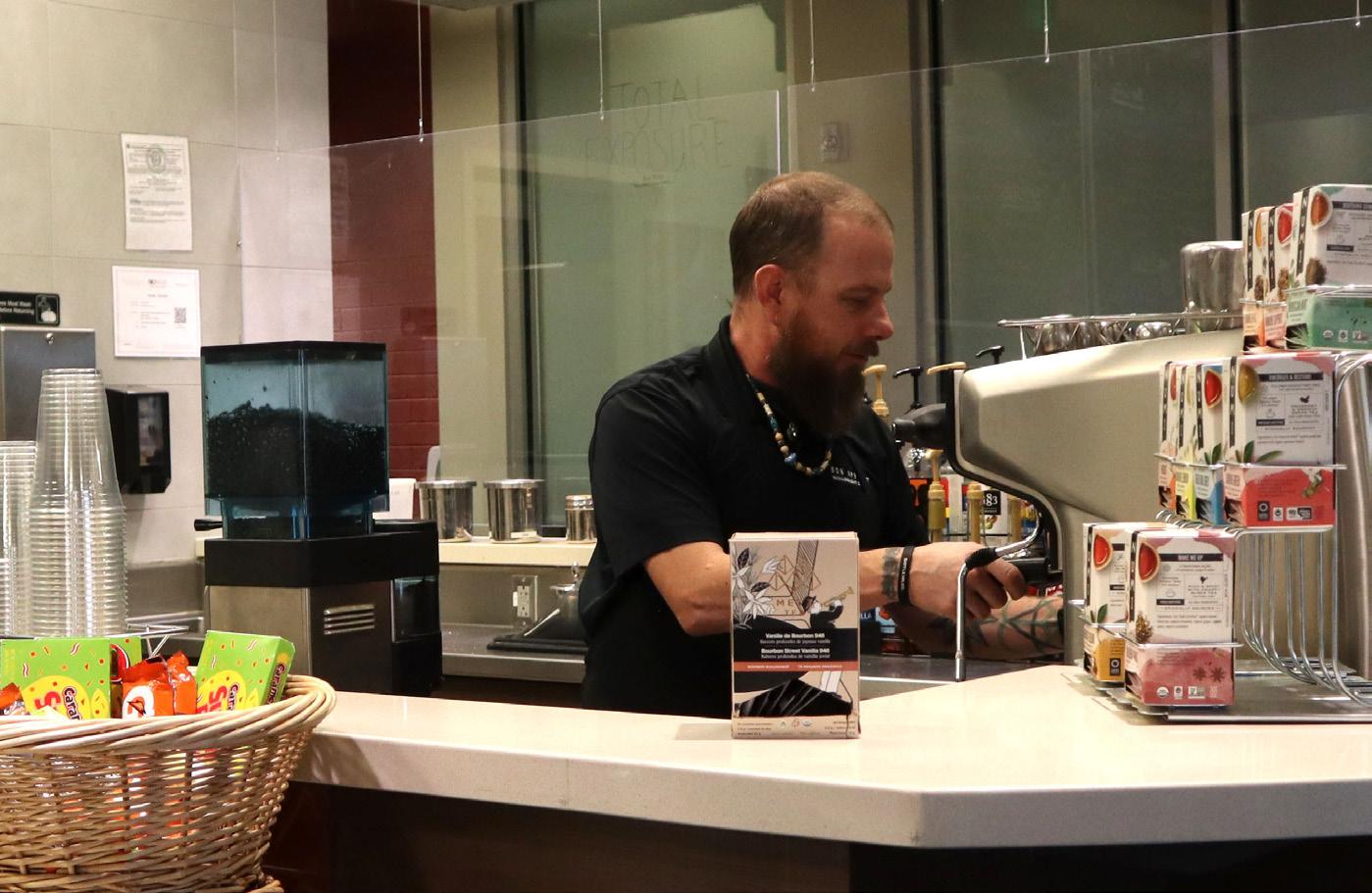
“My favorite part about the job is all the great people you get to meet,” Forbush said. “I really, really enjoy just meeting all the creative and exciting people.”
Griff's experienced a supply shortage during Fall semester in September, where they were out of chai for “about a week,” according to an Instagram post from The Forum.
“There’s been a learning curve and a pretty nasty one,” Forbush
reasons I am taking this job so seriously,” Forbush said. “I believe that once we get that coffee shop to produce and operate even more smoothly than it is now, it will provide us the opportunity to continue growing and improving on what we can offer there, and the way that we do that is by taking good care of the students and the staff here.”
Soon-to-be Westminster Grads
Undergraduate school commencement is May 6 at 11 a.m. Commencement for the graduate school takes place May 5 at 5 p.m. Both ceremonies are located on Dumke Field.

Pick up regalia at the Grad Fair on April 5–6 in the Kim T. Adamson Alumni House.
Caps, gowns and diplomas will be released only if all financial and academic holds are cleared in students’ Self-Service accounts.
8 PODCASTS
Visit westminstercollege.edu/commencement for more details.


















